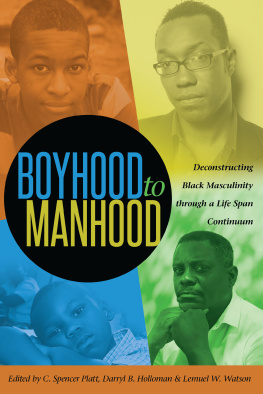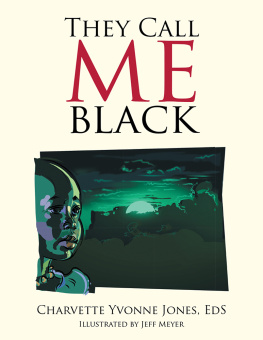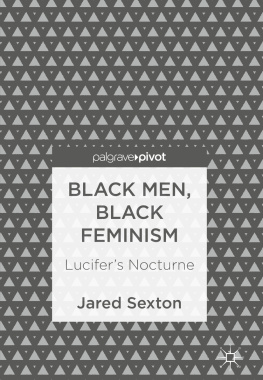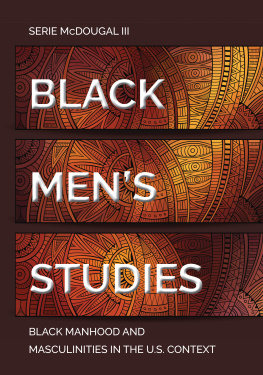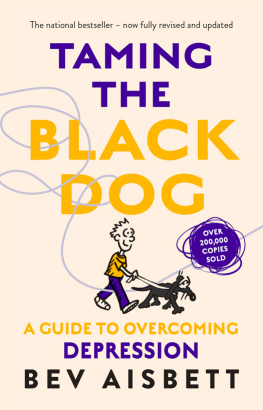
Praise for the Second Edition
Ricky Joness Black Haze is an important study of black male identity development. By examining black mens relationship with fraternities, he uncovers larger and brilliantly penetrating insights into issues of masculinity and political identity among African American males in the post-civil rights era.
Peniel E. Joseph, author of Waiting Til the Midnight Hour :
A Narrative History of Black Power in America
Black Haze is a compelling survey of black Greek-letter organizations, their history, purpose, and their most damning traditions. This is an examination of how the virtues of brotherhood and civic service coexist with brutal violence and cruelty within some of the oldest organizations in black America. Professor Jones has produced a vital contribution about a crucial and enduring problem.
William Jelani Cobb, author of The Substance of Hope:
Barack Obama and the Paradox of Progress
Black Haze is a riveting coup de grae against ritualized violence in black fraternities. The second edition of Black Haze is the most penetrating, illuminating, and articulate sociopolitical and cultural analysis of the chilling legacy of violence in black Greek-letter fraternities. As one of the worlds leading authorities on black masculinity and organizations, Ricky Jones intelligently confronts traditional verities, social norms, and myths that seek to justify and continue ritualized violence in black fraternities through the courageous prism of a reformed insider dedicated to the preservation of black dignity and life.
Jeremy I. Levitt, author of Black Women and International Law:
Deliberate Interactions, Movements and Actions
BLACK HAZE
Second Edition
SUNY series in African American Studies
John R. Howard and Robert C. Smith, editors
BLACK HAZE
Violence, Sacrifice, and Manhood in Black Greek-Letter Fraternities
Second Edition
Ricky L. Jones
Published by State University of New York Press, Albany
2015 State University of New York
All rights reserved
Printed in the United States of America
No part of this book may be used or reproduced in any manner whatsoever without written permission. No part of this book may be stored in a retrieval system or transmitted in any form or by any means including electronic, electrostatic, magnetic tape, mechanical, photocopying, recording, or otherwise without the prior permission in writing of the publisher.
For information, contact State University of New York Press, Albany, NY
www.sunypress.edu
Production, Ryan Morris
Marketing, Kate R. Seburyamo
Library of Congress Cataloging-in-Publication Data
Jones, Ricky L.
Black haze : violence, sacrifice, and manhood in black greek-letter fraternities / Ricky L. Jones.Second edition.
pages cm. (Suny series in African American studies)
Includes bibliographical references and index.
ISBN 978-1-4384-5673-7 (hardcover : alk. paper) ISBN 978-1-4384-5672-0 (pbk. : alk. paper) ISBN 978-1-4384-5674-4 (e-book) 1. Greek letter societiesUnited States. 2. African American college studentsConduct of life. 3. HazingUnited States. I. Title.
LJ51.J66 2015
371.85dc23
2014027655
10 9 8 7 6 5 4 3 2 1
For my daughter, Jordan. May you never belong to a group that places your humanity or your life at risk.
Contents
Chapter Four: The Pledge Process as Sacrifice
Preface to the Second Edition: Black Haze Revisited
In 2004, the first edition of Black Haze: Violence, Sacrifice, and Manhood in Black Greek-Letter Fraternities became the first (and remains the only) scholarly monograph specifically dedicated to analyzing violent hazing in these groups. The book was the last in an important trilogy on black Greek-letter organizations (BGLOs) published at the turn of the century. The first two were Lawrence Rosss Divine Nine in 2000 and Walter Kimbroughs Black Greek 101 in 2003. Both books were essential historical primers for anyone interested in black fraternities and sororities. Black Haze completed the set with a targeted exploration of the myriad motives behind the organizations most troubling and persistent illviolent hazing.
A number of other books on BGLOs have surfaced, as the subject has grown in popularity over the last decade. They have ranged from works targeting particular organizations to broader interrogations of different aspects of the groups. They have also run the gamut in quality. A few have been thoughtful, whereas others have been little more than shortsighted brag pieces written by BGLO-affiliated apologists. The market for these books has grown because black Greeks have often found themselves in the news in recent yearsfor all the wrong reasons. To be sure, sex, dysfunctionality, and death sell in America. Black Greek culture has its share of all these.
Dramas surrounding black Greeks and subsequent analyses have carved out space for a new and small category of people classifying themselves as black Greek scholarsa label I personally reject. Neither Black Haze nor any of the other work I have done concerning BGLOs in general or black Greek fraternities (BGFs) in particular has been intended to only be about or for black Greeks. My purpose has always been greater. At the end of the day, I am not a black Greek scholar, but a political philosopher with rather different intellectual, social, and political interests than many of my peers. So, it makes sense that I would produce an exploration rooted in the ideas of the likes of Antonio Gramsci, Jrgen Habermas, and Ren Girard, rather than theories deployed by historians, sociologists, or student affairs professionals. Consequently, Black Haze is a very different book from those that preceded or followed it. The fact that both the book and I are anomalous animals that do not neatly fit into the normal black Greek genre has caused problems.
Like many works, Black Haze is a classic example of the old adage, You cant judge a book by its cover. Understandably, anyone looking at the original jacket, adorned with the Greek symbols of every major black fraternity, would think the book was only about these organizations. Those who actually read it realize this initial assumption is wrong. Admittedly, the misunderstanding (which has resulted in frustration for me as well as others over the years) was just as much my fault as that of the willfully anti-intellectual people who drew flawed conclusions without reading.
Writing is an artistic exercise. Like all art, books never turn out exactly as the artist originally envisions them. The process of research and writing takes one down unforeseen paths, presents new possibilities, and yields epiphanies and quandaries by the end that are simply not in the authors sightline at the beginning. If I am to criticize my readers (or nonreading critics) for making assumptions about or downright misunderstanding Black Haze , I must also admit that almost two decades ago a part of me really didnt understand exactly what was to come. One must remember that the original edition of this book was the culmination of work started ten years earlier, following the death of Michael Davis at Southeast Missouri State University in 1994. In my mid-twenties at the time, I was quite romantic about the prospect of producing a study that would ultimately help BGFs and their stakeholders figure out ways to quell or eradicate violent hazing. Years later, a more realistic (even more cynical) me must admit that I failed miserably in that respect.



